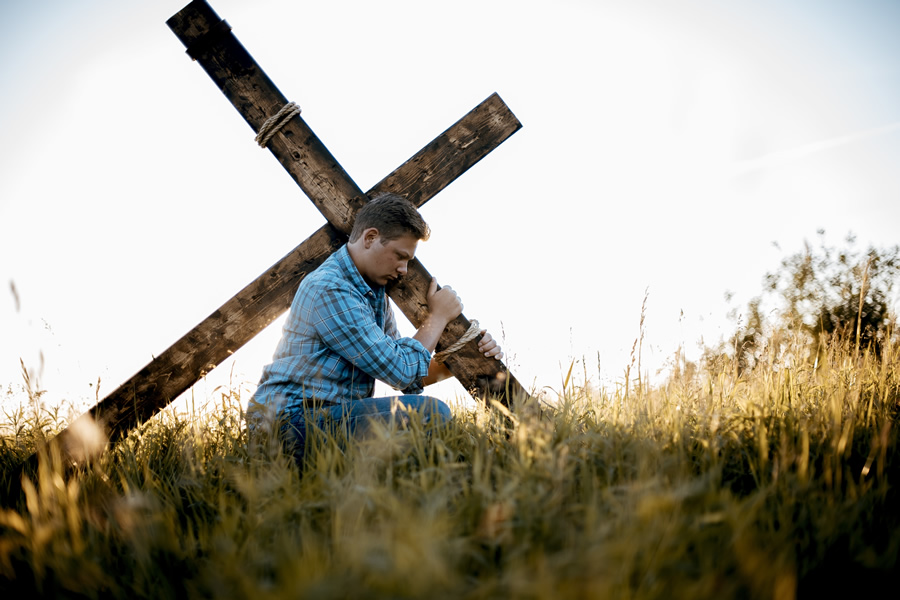Blog & Pastor Letters

22nd Sunday in Ordinary Time – September 3, 2023
09-03-2023Weekly ReflectionFr. Joseph SigurSimon, having received his new name “Peter” after his confession of faith at Caesarea Philippi, the “rock on which he will build his Church” (Mt 16:18), almost immediately receives a very different title from Jesus: “Satan.” Jesus, of course, uses this title with its traditional meaning: an “opposer” or “adversary,” telling Simon Peter: “You are a stumbling block (σκάνδαλον) to me, for you are not on the side of God, but of men.” (Mt 16:23) The same disciple who five verses prior was named the “rock” on which Christ would build his church has become a “stumbling block.”
Peter’s problem is the problem of nearly every Christian. Peter is unable to understand how the same Jesus who has just been professed as “the Christ (Messiah), the Son of the living God,” can in the very next breath go on to speak about the necessity of his suffering, and dying, and rising. Peter is unable to enter the “paradox” of Christian discipleship and so becomes a “stumbling block.” His innate human desire to preserve his life not only prevents him from understanding what Jesus could possibly mean when he outlines the cost of discipleship, but even leads him to actively rebuke Jesus when he prophesies his suffering, dying, and rising. Peter is unable to wrap his head around the idea of a suffering and dying Messiah.
G.K. Chesterton once noted that “Paradox has been defined as ‘Truth standing on her head to attract attention,’”1 and Jesus’ teaching about the cost of discipleship — self-denial, taking up one’s cross — certainly attracts Peter’s and indeed every Christian’s attention. How can a man reign through dying, conquer through seeming defeat, obtain glory through humility? And yet as bizarre as it may seem, the Christian is introduced into this “paradox” from the very beginning. Before the baptismal waters even touch our heads, we are claimed “for Christ our Savior by the sign of his Cross” traced on our foreheads (Order of Baptism). We are introduced into this paradox which accompanies us our whole life long: discipleship means self-denial because discipleship for the Christian is sequela Christi: imitating the self-denial and humility of the one who “brought about Redemption through suffering,” and by doing so, has also “raised human suffering to the level of the Redemption.” (SD, 19)
Internalizing this paradox, however, is life’s project as a Christian. In my own life and ministry, it has been explained how the devout person faced with the mystery of suffering and death can question God’s benevolence, while at the same time the once-hardened criminal can face execution with absolute tranquility; how those who face terminal illness can radiate joy and tranquility, while many of those who experience minor inconveniences can curse God under their breath. Our sequela Christi depends on the degree to which we have entered this paradox and plumbed its depths.
It is interesting that the word doxa in Greek, while originally meaning “an opinion, judgment, view,” (hence “paradox,” a “contrary view”) has in the course of Christian history come to mean “glory, exaltation.” The Christian world “view” (doxa), the Christian’s path to “glory” (doxa), is “paradoxical.” It requires us, like Peter, to examine those truths which Christ reveals in the Gospel which run contrary to our innate way of thinking — death leading to life, self-denial leading to the greatest prize, suffering leading to happiness — and to overcome with Simon Peter these “stumbling blocks,” even if we ourselves are the stumbling block. It requires us, like St. Thérèse of Lisieux, to seek out those little sufferings, tiny acts of love, that will prepare us for the greater sufferings, the more demanding acts of love. It requires us to deny ourselves if we are to follow Him.
BACK TO LIST